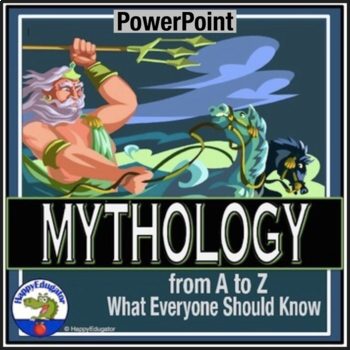Mythology PowerPoint - What Everyone Should Know From A-Z with Easel Assessment
- PPTX
- Microsoft OneDrive
- Easel Assessment
What educators are saying
Description
Mythology PowerPoint - What Everyone Should Know From A-Z PowerPoint and Easel Assessment. Slides on what is a myth, classical mythology, and the main characters and myths of Greek and Roman mythology. Photos of statues and ruins, coins and ancient art, as well as interesting facts about the gods, goddesses, and heroes of ancient Greece. Build background knowledge before starting any mythology unit. 69 informational slides, 50 question/answer slides, and 25 Easel Assessment pages.
Includes information on the following: Achilles, Adonis, Agamemnon, Amazons, Aphrodite (Venus), Apollo, Ares (Mars), Artemis (Diana), Athena (Minerva), Atlas, Cerberus, Cyclops, Daphne, Daedalus, Delphic Oracle, Demeter (Ceres), Echo, Eros (Cupid), Eurydice, Fates, Furies, Golden Fleece, Gordian Knot, Hades (Pluto), Hector, Helen of Troy, Hephaestus (Vulcan), Hera (Juno), Hercules, Hermes (Mercury), Icarus, Jason and the Golden Fleece, Labyrinth, Medusa, Midas, Minotaur, Narcissus, Nymph, Odysseus (Ulysses), Oedipus, Olympus, Orpheus, Pan, Pandora’s Box, Paris, Pegasus, Penelope, Persephone (Proserpina), Phoenix, Poseidon (Neptune), Prometheus, Psyche, Pygmalion, Romulus and Remus, Saturn, Sphinx, Styx, Titans, Trojan Horse, Trojan War, Troy, and Zeus (Jupiter).
There is so much information in this PowerPoint, that I like to divide this up into smaller chunks. You can show the presentation in its entirety in about two days, giving time for class discussion. At the end there is a self-checking 25 question review. Also includes a 25 question self-grading Easel Assessment.
Did you know that you can use PowerPoints like this in Zoom for distance learning? You can also share with your students in OneDrive or in Teams, too. Just make sure to tell them to view in Slideshow mode. If you don’t want them to have the answer key, remove it first. ;) You can also upload to Google Slides, and it will automatically convert. It is editable and easy to make adjustments if necessary.
Supports Common Core State Standards.
CCSS.ELA-Literacy.RL.4.4 Determine the meaning of words and phrases as they are used in a text, including those that allude to significant characters found in mythology (e.g., Herculean).
CCSS.ELA-Literacy.RL.4.9 Compare and contrast the treatment of similar themes and topics (e.g., opposition of good and evil) and patterns of events (e.g., the quest) in stories, myths, and traditional literature from different cultures.
You may also like:
Myth Writing Lesson for Middle School
Myths, Legends, Fables, and Fairytales PowerPoint
Follow me HERE to get notified of updates, sales, free resources, and new products. All new products are 50% off for 48 hours.
© Deborah Hayes aka HappyEdugator. For classroom and homeschool use. Your purchase buys one license. You may purchase extra licenses at a discount.






